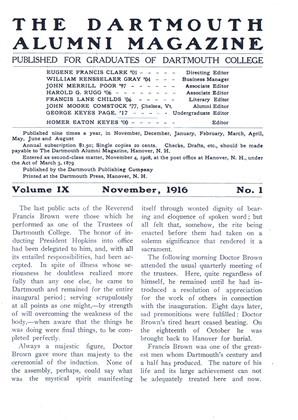Inaugural Address of the President
College is means to an end. This statement of fact, even if, perchance, it be lacking in originality of conception or novelty of form, is so fundamental to all right thinking in regard to college administration as to demand constant consideration and not infrequent reiteration—and rarely if ever has it required emphasis so insistently as now. If I read aright the purposes of our ancient foundations, or of the devoted lives of those whose work has made our colleges what they are; or if I interpret aright the overwhelming need of times to come, the end is constructive idealism interpreted in terms of service.
Civilization is being shaken to its deepest foundations, and agnosticism is rife in regard to much thati has been accepted as axiomatic in life. Many a conclusion has been abandoned that until recently has been held rigidly, and it is yet impossible to know what premises may be established from which the conclusions of the future shall be drawn. We hardly know more than that a great winnowing of human affairs is in process, separating the essential from the incidental and attaching to each its rightful value in symbols that all may read. Matters formerly of little more than speculative interest,—such for instance as those concerned with the conservation of wealth through personal and national economies,—have all at once become of the most practical concern.
Peoples in convulsions and governments narrowly escaped from death will never resume life on the basis of customs and sufferances extant but so little time ago in our academic calendar, as the freshman year of our seniors now in college. This suddenness with which conditions have changed is matched only by the extent to which they have been transformed. Never has an epoch in the world's history been so plainly differentiated to the men of its generation as is this time in which we live. We stand on the threshold between two eras, and it is given to those of thoughtful minds to comprehend in some measure the significance of this vantage ground.
It has been said that an enduring college always dwells on the mountain top, that its face may first reflect the light of the coming day. As yet we fail to see the dawn, but we can seek to establish ourselves upon the heights and to hold ourselves in readiness for the sun's first gleam. There is no time for sleeping. That which shall come will come quickly at the last, and those things which are to be done will be doubly well done if done on the moment,and this is no less true for the colleges than for other institutions of mankind. Meanwhile, in the darkness which surrounds us we have consciousness of certain changes which are being wrought.
A wide and rapidly increasing seriousness is abroad in the earth, to the effects of which we as a nation must respond as definitely as we respond to the economic tendencies among numerous peoples or to the policies of statecraft of great governments of the world. It is, moreover, a circumstance of the utmost consequence that when we, who crave so much for our national life, are called with other nations of the earth to make response to these world tendencies, we must make it without the spiritual uplift or the purification of purpose which is so plainly developing among those nations which have staked all for their ideals. Neither does it appear that we, as a people, are vitally absorbed in carrying through to completion any of those projects so aptly called by Professor James "the moral equivalents of war. Herein tor the college are great obligation and great opportunity alike, and upon the contribution which it shall be equipped and prepared to make will depend the relative importance of the college to life at large in years to come.
It is a certainty that such a revaluation of customs and institutions is imminent as has heretofore been unknown; and no sentimental consideration can be expected for such as cannot prove their worth. Under these exigencies the historic college must submit itself, without arrogance, to searching audit, and as it offers the exhibit of its honorable past, it must show its potentiality for 'the future. Such a requirement presupposes complete receptivity of mind and a self-respecting humility that makes impossible didactic statements or ipsedixit assertions. ' We who engage ourselves in college work cannot well do more than to review what seem to be the enduring principles of our respective foundations and our subsequent achievements, and attempt to define the spirit and the aspirations with which we approach the overwhelming problems of the future so immediately before us.
 View Full Issue
View Full Issue
More From This Issue
-
 Article
ArticleThe last public acts of the Reverend Francis Brown
November 1916 -
 Class Notes
Class NotesCLASS OF 1912
November 1916 By Conrad E. Snow -
 Class Notes
Class NotesCLASS OF 1912
November 1916 By Conrad E. Snow -
 Class Notes
Class NotesCLASS OF 1912
November 1916 By Conrad E. Snow -
 Class Notes
Class NotesCLASS OF 1910
November 1916 By Sturgis Pishon -
 Class Notes
Class NotesCLASS OF 1910
November 1916 By Sturgis Pishon
Article
-
 Article
Article"DARTMOUTH COLLEGE—A BOOK OF INFORMATION"
November 1917 -
 Article
ArticleA Wah Hoo Wah for –
FEBRUARY 1969 -
 Article
Article1961 Fall Weekends Set
June 1974 -
 Article
ArticleBaseball
MAY 1959 By CLIFF JORDAN '45 -
 Article
ArticleTuck School
March 1945 By G. W. Woodworth. -
 Article
ArticleThe Drinking Water Challenge
JANUARY 1999 By JON WALDMAN '00


